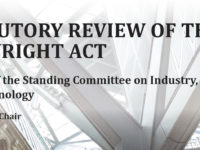What to do about Huawei? The Chinese telecom giant has emerged as one of Canada’s most challenging policy issues, raising concerns involving competition, communications, security, and trade not to mention kidnappings and arrests of corporate personnel. The government has repeatedly promised to articulate a policy on the use of Huawei equipment in Canada’s next generation wireless networks only to regularly delay doing so. Dr. Christopher Parsons, a senior research associate at the Citizen Lab, the world-famous cyber-security lab located at the Munk School of Global Affairs and Public Policy at the University of Toronto, joins the podcast to help sort through fact from fiction when it comes to Huawei.
Episode 16: The Copyright Review Report: Carys Craig on the Roadmap for the Future of Canadian Copyright Law
In December 2017, the Canadian government launched its much-anticipated and much-lobbied review of Canadian copyright law, tasking the Standing Committee on Industry, Science and Technology to lead the way. After months of study and hundreds of witnesses and briefs, the committee released its authoritative report with 36 recommendations earlier this month. Carys Craig, a law professor at Osgoode Hall Law School and one of Canada’s leading copyright law experts, joins the podcast to help sort through the report and to consider what it means for the future of Canadian copyright law.
Episode 15: Cows, Cars, and Copyright: A Conversation With Myra Tawfik on the IP Concerns With Implementing Canada-US-Mexico Trade Deal
The new NAFTA – dubbed the USMCA or CUSMA depending on where you live – took a significant step forward recently with the introduction of Canadian legislation designed to ratify the treaty. The economic implications of the agreement are enormous, particularly with respect to digital issues and intellectual property. Myra Tawfik, a law professor at the University of Windsor and Senior Fellow with CIGI, joins the podcast this week to discuss Canada’s longstanding history of facing external pressure on copyright, the role that trade negotiations now play with that pressure, and the implications of the USMCA.
Episode 14: Big Data, Privacy and Democracy: A Conversation With Nathaniel Erskine-Smith on the International Grand Committee
The debate over big data, privacy and its implications for democracy came to Ottawa last week as the International Grand Committee brought together the world’s biggest technology companies, politicians from around the world, and leading thinkers. Liberal MP Nathaniel Erskine-Smith, the Vice-Chair of the Standing Committee on Access to Information, Privacy, and Ethics joins the podcast this week to reflect on the three days of hearings, the prospect for global reforms, and what comes next for the committee.
Episode 13: Digital Charter or Chart: A Conversation With Teresa Scassa on Canada’s New Digital Charter
Years of public consultation on Canadian digital policy hit an important milestone last week as Innovation, Science and Economic Development Minister Navdeep Bains released the government’s Digital Charter. Canada’s Digital Charter touches on a wide range of issues, covering everything from universal Internet access to privacy law reform. To help sort through the digital charter and its implications, I’m joined on the podcast this week by Professor Teresa Scassa, a law professor at the University of Ottawa, where she holds the Canada Research Chair in Information Law and Policy.











